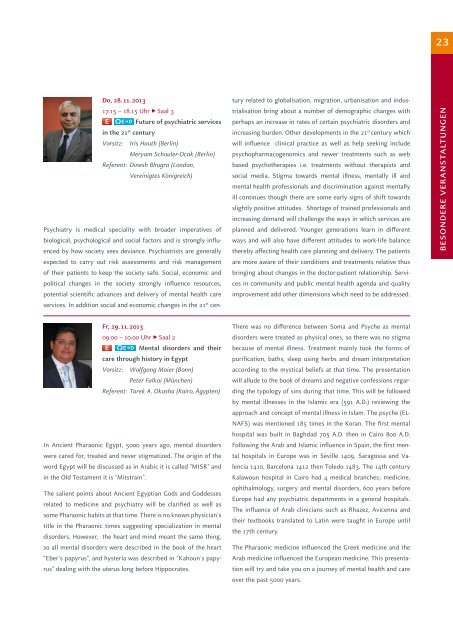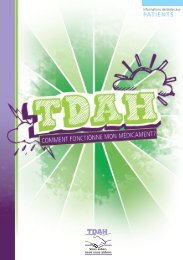Programm - MEDICE.CH - Salmon Pharma
Programm - MEDICE.CH - Salmon Pharma
Programm - MEDICE.CH - Salmon Pharma
Sie wollen auch ein ePaper? Erhöhen Sie die Reichweite Ihrer Titel.
YUMPU macht aus Druck-PDFs automatisch weboptimierte ePaper, die Google liebt.
23<br />
Do, 28. 11. 2013<br />
17.15 – 18.15 Uhr a Saal 3<br />
EUD Future of psychiatric services<br />
in the 21 st century<br />
Vorsitz: Iris Hauth (Berlin)<br />
Meryam Schouler-Ocak (Berlin)<br />
Referent: Dinesh Bhugra (London,<br />
Vereinigtes Königreich)<br />
Psychiatry is medical speciality with broader imperatives of<br />
biological, psychological and social factors and is strongly influenced<br />
by how society sees deviance. Psychiatrists are generally<br />
expected to carry out risk assessments and risk management<br />
of their patients to keep the society safe. Social, economic and<br />
political changes in the society strongly influence resources,<br />
potential scientific advances and delivery of mental health care<br />
services. In addition social and economic changes in the 21 st century<br />
related to globalisation, migration, urbanisation and industrialisation<br />
bring about a number of demographic changes with<br />
perhaps an increase in rates of certain psychiatric disorders and<br />
increasing burden. Other developments in the 21 st century which<br />
will influence clinical practice as well as help seeking include<br />
psychopharmacogenomics and newer treatments such as web<br />
based psychotherapies i.e. treatments without therapists and<br />
social media. Stigma towards mental illness, mentally ill and<br />
mental health professionals and discrimination against mentally<br />
ill continues though there are some early signs of shift towards<br />
slightly positive attitudes. Shortage of trained professionals and<br />
increasing demand will challenge the ways in which services are<br />
planned and delivered. Younger generations learn in different<br />
ways and will also have different attitudes to work-life balance<br />
thereby affecting health care planning and delivery. The patients<br />
are more aware of their conditions and treatments relative thus<br />
bringing about changes in the doctor-patient relationship. Services<br />
in community and public mental health agenda and quality<br />
improvement add other dimensions which need to be addressed.<br />
BESONDERE VERANSTALTUNGEN<br />
Fr, 29. 11. 2013<br />
09.00 – 10.00 Uhr a Saal 2<br />
EUD Mental disorders and their<br />
care through history in Egypt<br />
Vorsitz: Wolfgang Maier (Bonn)<br />
Peter Falkai (München)<br />
Referent: Tarek A. Okasha (Kairo, Ägypten)<br />
In Ancient Pharaonic Egypt, 5000 years ago, mental disorders<br />
were cared for, treated and never stigmatized. The origin of the<br />
word Egypt will be discussed as in Arabic it is called "MISR" and<br />
in the Old Testament it is "Mitstrain".<br />
The salient points about Ancient Egyptian Gods and Goddesses<br />
related to medicine and psychiatry will be clarified as well as<br />
some Pharaonic habits at that time. There is no known physician's<br />
title in the Pharaonic times suggesting specialization in mental<br />
disorders. However, the heart and mind meant the same thing,<br />
so all mental disorders were described in the book of the heart<br />
“Eber's papyrus”, and hysteria was described in “Kahoun's papyrus”<br />
dealing with the uterus long before Hippocrates.<br />
There was no difference between Soma and Psyche as mental<br />
disorders were treated as physical ones, so there was no stigma<br />
because of mental illness. Treatment mainly took the forms of<br />
purification, baths, sleep using herbs and dream interpretation<br />
according to the mystical beliefs at that time. The presentation<br />
will allude to the book of dreams and negative confessions regarding<br />
the typology of sins during that time. This will be followed<br />
by mental illnesses in the Islamic era (591 A.D.) reviewing the<br />
approach and concept of mental illness in Islam. The psyche (EL-<br />
NAFS) was mentioned 185 times in the Koran. The first mental<br />
hospital was built in Baghdad 705 A.D. then in Cairo 800 A.D.<br />
Following the Arab and Islamic influence in Spain, the first mental<br />
hospitals in Europe was in Seville 1409, Saragossa and Valencia<br />
1410, Barcelona 1412 then Toledo 1483. The 14th century<br />
Kalawoun hospital in Cairo had 4 medical branches; medicine,<br />
ophthalmology, surgery and mental disorders, 600 years before<br />
Europe had any psychiatric departments in a general hospitals.<br />
The influence of Arab clinicians such as Rhazez, Avicenna and<br />
their textbooks translated to Latin were taught in Europe until<br />
the 17th century.<br />
The Pharaonic medicine influenced the Greek medicine and the<br />
Arab medicine influenced the European medicine. This presentation<br />
will try and take you on a journey of mental health and care<br />
over the past 5000 years.
















